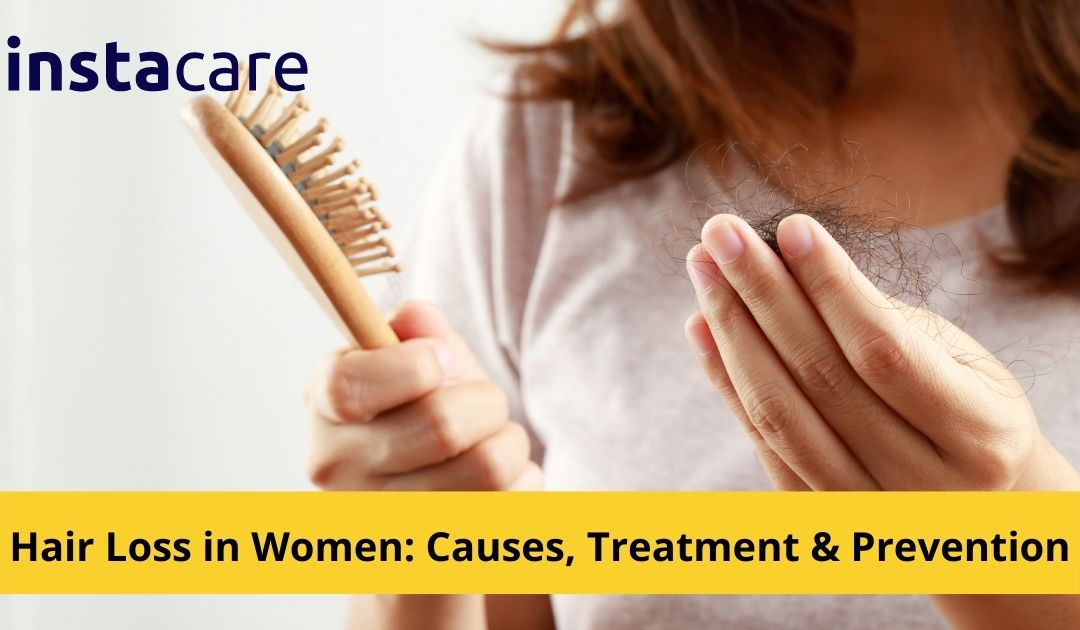Hair loss in women is characterized as when a lady loses her hair suddenly and heavily. Hair shedding is a regular thing in which some strands fall out while others regrow. When the hair cycle is disturbed, hair will fall out, less hair comes in, and hair loss occurs. Hair shedding is not like hair loss. Alopecia is the medical word used for hair loss.
Which Women Are Likely To Experience Hair Loss?
Any girl or woman can get the problem of hair loss. However, it is more common in the followings females:
- Women above the age of 40.
- Women who have recently given birth.
- Survivors of chemotherapy who other medications have already damaged.
- Women routinely use harsh chemicals on their hair or choose hairstyles that pull it (such as tight ponytails or tight braids). Women who have reached menopause.
- Women who have reached menopause.
Symptoms Of Hair Loss
The followings are the significant signs which you observe when you are experiencing hair loss:
- Observing more hair fall out on your brush, the floor, showers, pillows, or the daily sink.
- Having visible patches of hair that are thinner or gone
- Seeing the head skin through the hairs
- Seeing hair fall out.
Causes Of Hair Loss In Women
Many individuals feel that hair loss is entirely a male issue. More than 50% of all women, on the other hand, are predicted to experience significant hair loss Female-pattern hair loss (FPHL) is the most frequent cause of hair loss in women, affecting around 30 million people.
Hair loss can be caused by several factors, including illness, poor nutrition, hormonal imbalances, and acute stress. The following gives you the detail:
Thyroid Issues Cause Hair Loss
Because each illness produces a hormonal imbalance, hair loss can result from either an underactive thyroid, hypothyroidism or an overactive thyroid, often known as hyperthyroidism.
Hair Loss Due To Pregnancy
Hair loss can also be caused by hormonal imbalances, particularly the dramatically shifting hormones during pregnancy and childbirth. This occurs three months after the child is born.
Hair Loss Due To Medications
Medications that thin the blood, oral contraceptives, antidepressants, NSAIDs, and beta and calcium channel blockers can cause hair thinning or baldness. Hair loss can also be caused by too much vitamin A or retinoids, vitamin A-based medicines.
Hair Loss Due To Autoimmune Diseases
Some forms of hair loss are thought to be caused by alopecia areata, which is commonly connected with an autoimmune condition. Autoimmune diseases, including diabetes and lupus, can lead to hair loss.
View More: Various Signs Of Mental Breakdown You Must Know
How To Treat Hair Fall?
Hair loss can be treated in various ways, but the best option for you will depend on the cause of your hair loss. Medications will almost certainly be the first line of defense. Medication treatments include:
Prescription And OTC Medication
Minoxidil is a kind of rogaine that is used in cosmetics. Rogaine is available over-the-counter (OTC) as a cream or a foam. Apply it twice a day to the scalp to promote hair development and prevent hair loss. Finasteride is a kind of Propecia and Proscar finasteride. Finasteride is a prescription drug that must be used daily. It can only be obtained with the help of a doctor's prescription.
Hair Transplant
There are two types of hair transplants.
- Follicular unit transplant
- Follicular unit extraction
The two most frequent hair transplant methods are follicular unit transplanting and follicular unit extraction. It's essential to keep in mind that both hair transplant operations are considered surgeries, which can be expensive and painful. Other possible adverse effects include infections and scarring. You may require multiple hair transplant treatments to attain the desired result.
Laser Treatment
Laser treatment is known to lessen follicles' swelling that stops them from growing back. Treatment for male pattern hair loss with low-level laser therapy (LLLT) is safe and reliable.
Hair Loss Treatment At Home
The followings are some home-based treatments:
- Eating a more protein diet such as meat, eggs, and nuts, reduce hair loss.
- Massaging the scalp to stimulate blood flow to the scalp could help encourage hair growth.
- Using pumpkin seed oil to help hair growth.
- Trying aromatherapy, examples of herbs used in aromatherapy to promote hair growth include cedarwood, lavender, rosemary, thyme, and tulsi.
Conclusion
There are a variety of hair loss treatments you can attempt. These include over-the-counter and prescription medications, hair implants, and home remedies. Consult your physician beforehand. They can assist you in determining the reason for your hair loss and the best treatment option for you.
Please book an appointment with the Best Cosmetic Surgeon in Lahore, Karachi, Islamabad, and all major cities of Pakistan through InstaCare, or call our helpline at 03100002273 to find the verified doctor for your disease.











